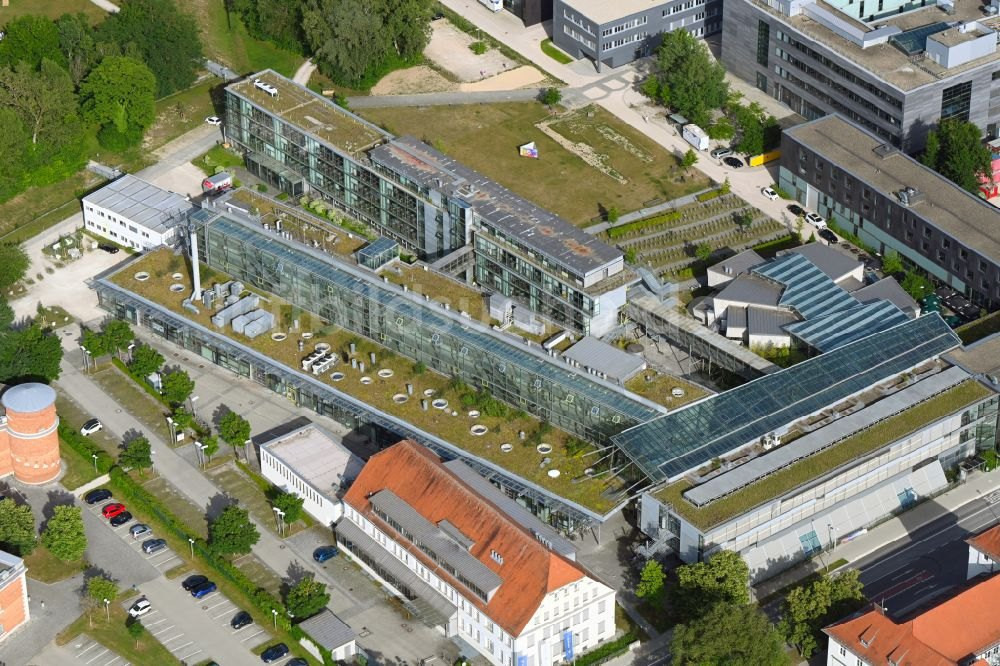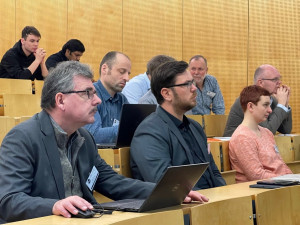IMAPS spring seminar 2024 in Ingolstadt
This year, the IMAPS Germany spring seminar took place in Ingolstadt. The theme was "Electronics for the car of tomorrow". What more suitable location could we have found than the premises of Ingolstadt University of Applied Sciences? The Fraunhofer Application Center "Networked Mobility and Infrastructure", headed by Prof. Dr. Gordon Elger, has been working on this topic for some time.
After the well-attended pre-event meeting at the Augustiner Bräu Theresienhof, experts and interested parties from industry and research met on February 20 for an intensive exchange of experiences and results on the wide range of topics for the mobility of tomorrow - from power electronics to AI-supported quality control.
During the breaks between the 12 presentations, a total of 61 participants discussed scientific aspects, technological sub-processes and applications in the lecture hall's vestibule. This time was particularly devoted to the presentation of the industrial partners. UniTemp GmbH, CyberTechnologies GmbH, ROARTIS, PacTech-Packaging Technologies GmbH, nanotec international GmbH, F&K Delvotec Bondtechnik GmbH, ATV Technologie GmbH took the opportunity as exhibitors to present their products and services during the breaks between the lectures. The scientific and technological contributions were divided into three blocks at this spring seminar.
 Venue TH Ingolstadt (® euroluftbild.de/Robert Grahn)
Venue TH Ingolstadt (® euroluftbild.de/Robert Grahn)
The first block focused on the diverse aspects of manufacturing. Marko Scherf from the Ilmenau University of Technology opened the series of lectures with the topic "Power electronic system integration taking into account the optimum switching frequency". He was able to show that magnetic components are reaching a real limit in the increasing desire for volume reduction. The aim here is to find a suitable, optimum ratio between AC and DC components. In the second presentation, we were then confronted with AI-supported electronics production. Thomas Kleinert from Continental Automotive Technologies GmbH introduced this topic under the title "Artificial intelligence in electronics production". Using the example of optical quality control, he showed the path from the use of an operator through the use of an AOI to the training of the AI. A neural network is currently being set up for an SMT assembly. But the goal is, of course, more global fault detection. This requires a much greater degree of abstraction in the concept. Klaus Müller from Osram GmbH continued the lecture block with the topic "Challenges of interconnect technology for future automotive and mobility applications". He discussed the basic technology steps in next-generation display production, as the use of µ-LED chips requires not only new handling methods but also extremely high placement accuracy. This includes the development of new coating systems with low roughness values but at the same time extremely short solder wetting times. He formulated the reduction of the liquidus time from 60 seconds to 1 second as a target. We were able to win Sri Krishna Bhogaraju from CuNex GmbH as the fourth speaker at short notice. Most people already know him from our 2021 fall conference. He always inspires with his engaging presentation. His presentation entitled "Copper sintering for first and second level interconnects - opportunities, challenges and solutions" focused on the upcoming problems with the introduction of copper sintering pastes in competition with the already established silver sintering pastes.
After a first coffee break, during which the exhibitors' stands could be visited and discussions held on what had been heard, the second block of lectures on power electronics followed.
 Tilo Welker presented excerpts from the experience gained by Rogers Germany GmbH with the laser flash method for determining thermal resistance. He summarized the results to date under the general title "Base materials for power electronics". Attempts are currently being made to approach the problem of contact resistance in the simulation model of thermal resistance, as there is still a discrepancy between the actual measured thermal resistance and the previously calculated resistance in all models. The transition to concrete "surface requirements in power electronics" is then not difficult. Markus Meier from Zestron Europe summarized the essential requirements for the cleanliness of surfaces for electronic components. In the subsequent presentation by Hans-Jürgen Albrecht (budatec GmbH), the focus was again on copper sintering technology. Under the title "Copper sintering for first and second level interconnects - opportunities, challenges and solutions", he presented the results of an intensive literature research and important results from the cooperation with CuNex GmbH. Copper can be an adapted solution in the future, as it is not prone to dendrite growth like silver. However, the road ahead is still a rocky one. Lars Helmich from Hesse GmbH concluded this lecture block with the topic "Laser welding for power electronics: quality and process requirements". He presented the new challenges of wire bonding technology, as the ever-increasing current carrying capacity required calls for new and well-controlled wire bonding technologies. Intensive process control during welding is a prerequisite for good contacting.
Tilo Welker presented excerpts from the experience gained by Rogers Germany GmbH with the laser flash method for determining thermal resistance. He summarized the results to date under the general title "Base materials for power electronics". Attempts are currently being made to approach the problem of contact resistance in the simulation model of thermal resistance, as there is still a discrepancy between the actual measured thermal resistance and the previously calculated resistance in all models. The transition to concrete "surface requirements in power electronics" is then not difficult. Markus Meier from Zestron Europe summarized the essential requirements for the cleanliness of surfaces for electronic components. In the subsequent presentation by Hans-Jürgen Albrecht (budatec GmbH), the focus was again on copper sintering technology. Under the title "Copper sintering for first and second level interconnects - opportunities, challenges and solutions", he presented the results of an intensive literature research and important results from the cooperation with CuNex GmbH. Copper can be an adapted solution in the future, as it is not prone to dendrite growth like silver. However, the road ahead is still a rocky one. Lars Helmich from Hesse GmbH concluded this lecture block with the topic "Laser welding for power electronics: quality and process requirements". He presented the new challenges of wire bonding technology, as the ever-increasing current carrying capacity required calls for new and well-controlled wire bonding technologies. Intensive process control during welding is a prerequisite for good contacting.
After a well-deserved lunch break, the last block of lectures began. It focused on the general topic of sensor technology. This series was opened by Peter Aberl with a presentation on "Challenges and Opportunities of Centralized Radar Processing on the way to Autonomous Driving". He presented examples of possible "sensor fusions" (e.g. camera and radar) and interface relocations, which make more than 1.34 Gbps possible. However, this also requires interface standardization. Christian Geißler from Infineon Technologies AG then took us back to the hardware components. Under the title "Wafer Level RF System in Package for automotive radars" he showed possibilities for new package developments without loss of functionality. Our host Gordon Elger then had his say. The complexity of camera systems with a sufficient image sharpness of up to 30 m was summarized under the title "Packaging and reliability of optical ADAS sensors". He presented a new approach to package minimization of the complex lens package and the imager chip, which is to be realized by a curved imager chip. The spring seminar concluded with a presentation by Thomas Northemann from Robert Bosch GmbH entitled "Automated Driving - Chances and Challenges for Automotive MEMS". The company is working on redundant driver assistance systems to bridge so-called dead zones, e.g. in tunnels. Martin Schneider-Ramelow closed the event by thanking the organizers, in particular Prof. Gordon Elger and his team, the speakers and, of course, the exhibitors. At the same time, he gave an outlook on the next events in 2024 (see calendar of events below). It only remains to say (write): "The next IMAPS Germany spring seminar is definitely coming and we - the IMAPS board members - are looking forward to interesting discussions and exchanges of ideas and, of course, to continued lively participation."
Calendar of events
|
Venue |
Period |
Event name |
Organizer |
|
Landshut |
April 17, 2024 |
Symposium Electronics and System Integration (ESI) |
HS Landshut |
|
Toyama, Japan |
April 17 - 20, 2024 |
ICEP 2024 |
JIEP, IEEE EPS |
|
Tampere, Finland |
June 11 - 13, 2024 |
Nordpak |
IMAPS Nordic |
|
Grenoble, France |
June 19 / 20, 2024 |
MiNaPAD |
IMAPS France |
|
Edinburgh, Scotland |
July 15 - 17, 2024 |
High Temperature Electronics Network, (HiTEN) |
IMAPS UK |
|
Berlin, Germany |
September 11 - 13, 2024 |
Electronics System-Integration Technology Conference (ESTC) |
IEEE, IMAPS |
|
Boston, USA |
Sept. 30 - Oct. 3, 2024 |
57th International Symposium on Microelectronics |
IMAPS USA |
|
Munich, Germany |
October 17 / 18, 2024 |
Fall Conference |
IMAPS DE |
IMAPS Germany - Your association for packaging and packaging technology
IMAPS Germany, part of the International Microelectronics and Packaging Society (IMAPS), has been the forum in Germany for all those involved in microelectronics and packaging technology since 1973. With almost 300 members, we essentially pursue three important goals:
- we connect science and practice
- we ensure the exchange of information among our members and
- we represent the point of view of our members in international committees.
Imprint
IMAPS Germany e. V.
Kleingrötzing 1, D-84494 Neumarkt-St. Veit
1st Chairman: Prof. Dr.-Ing. Martin Schneider-Ramelow, Director of the Fraunhofer Institute for Reliability and Microintegration (IZM),
Treasurer
(for questions about membership and contributions):
Ernst G. M. Eggelaar,
You can find detailed contact information for the members of the Executive Board at www.imaps.de
(Executive Board)


